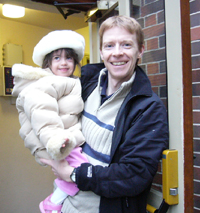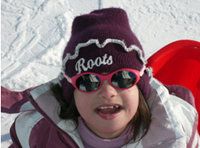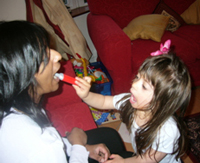Kirsty
Kirsty
Harrower, N. (2005) Kirsty. Down Syndrome News and Update, 4(4), 127-128. doi:10.3104/essays.343
Kirsty is a beautiful, lively three-year-old. Kirsty is loving, kind and at times cheeky. Kirsty loves "Noddy" and "The Tweenies" but she is not so keen on "Teletubbies". Kirsty is my daughter and she happens to have Down syndrome.
For my wife, Janet, and I having Kirsty has been the most wonderful experience. She has brought us great joy and like any parents we could not now imagine life without her. Of course when we were told our as yet unborn child had Down syndrome we were devastated. For me, the dreams of my child and her future were shattered - even worse when we were told she had duodenal atresia and a VSD. How would we cope? Were we strong enough to cope?
For us there was no question of not allowing the pregnancy to proceed - it was just a matter of trying to prepare ourselves. Looking back, knowing Kirsty had Down syndrome prior to the delivery was hard but it did allow us to come to terms with the situation and we had many special moments - feeling her kick, seeing her move on the many scans Janet had. We accepted her completely - this was our baby.
When she was delivered (by emergency C-section as is tradition for most medics babies!) she came out screaming and decidedly annoyed at being disturbed. She had her duodenal atresia repaired that day and we took her home after 12 days. We were thrilled.
We had a meeting with the community pediatrician who chatted about services and the importance of 'Early Intervention' to maximize developmental potential - we saw the physiotherapist within Kirsty's second week and she visited us weekly in the early months. We had useful support from the Down Syndrome Association and we read books - some by professionals, some by parents. Our families were learning too, but mainly we were all getting to know Kirsty.
Kirsty developed heart failure almost immediately and we syringed diuretics into her twice daily until she grew a bit bigger. Spironolactone tastes foul and to this day she still goes crazy if we try to give her calpol from a syringe! Her VSD was repaired at 8 weeks and then we realised how poorly she had been because now we had a baby that had the energy to scream the house down (a little known side effect of making a baby better!).
Much has happened since those early days. We moved to Sheffield when Kirsty was 2. By then she was babbling away happily. We have used Makaton signing to communicate with her since she was a baby. It is a great way of augmenting spoken language and it has actually been shown to speed-up acquisition of language skills. Kirsty now has about 70 signs which she uses or recognises. She is not talking yet because of a conductive hearing impairment but one day soon we know it will happen and when it does - just like when she took her first steps - we will cry and jump for joy at the same time.

Kirsty and dad
We attended a course early on at Down Syndrome Education International in Portsmouth. The importance of starting early was emphasized, as was the relative strength of children with Down syndrome in learning more visually than through auditory memory - hence the importance of Makaton.
Recently I was chatting with a colleague about our families and when I told her Kirsty had Down syndrome she said "I'm sorry". I think it just came as fairly unexpected news to her and this was her first reaction - I wasn't upset. Perhaps I even knew why she said it - pediatricians regularly have to deliver upsetting news to parents and it would not be surprising if the words "I'm sorry" are used in that situation. She had transferred the phrase to our social chat. But it made me think about what we as doctors say to our patients and their parents and how important our words are.
I still remember the cardiologist who told us that we were brave having our baby because of how difficult things would be as she got older - I can remember the words exactly while I'm sure he forgot his words almost immediately. How many times have I heard professionals' thoughtless phrases and clichés: "he suffers from Down syndrome" or "he is a Downs" or "children with Down syndrome are all lovely and enjoy music"….the list goes on. My point is we as professionals need to be careful what we say and how we say it - it really matters to parents and our patients.

Kirsty sledging in France
Having a child with Down syndrome is not a disaster - certainly it was a shock to discover the diagnosis but ultimately it really is not the end of the world. And as the parent of a child with a learning disability, I do not feel brave and I do not want anyone to feel sorry, either for me or more importantly my daughter. Of course, if someone were able to take away the extra chromosome I would say yes, but this isn't going to happen.

Checking mummy's temperature
Kirsty has Down syndrome but this does not define her as a person - it is part of her but there is so much more to our little girl. Her personality shines through and she has achieved so much in her 3 years. I am optimistic about her future. Kirsty, like most children with learning difficulties, will go to mainstream school and with the correct level of support this will be a success. A recent issue of the Down Syndrome Scotland magazine featured a teenager proudly holding his GCSE certificate. Many adults with Down syndrome live practically independent lives - working, socialising, having relationships. An individual with Down syndrome has the opportunity now to achieve so much more than even 10 years ago and as the beliefs/prejudices of society are challenged so much more may be possible in the future.
I said at the beginning of this piece that my dreams were shattered when I knew Kirsty had Down syndrome. Well, since then new dreams have emerged - I want Kirsty to be happy and to achieve her full potential. Only now I realise those dreams are identical to the ones I had before I knew about Kirsty's Down syndrome. After all, at the end of the day all any of us want is for our children to be happy and achieve their full potential.
Kirsty's dad, Neil, is Specialist Registrar in Paediatrics at the Sheffield Children's Hospital. In this short article, originally printed in the Sheffield Paediatric Reader, March 2005, Volume 10, Issue 3, he highlights the importance of the way in which health professionals communicate with parents, both at diagnosis and in the future. A recent large-scale survey in the US collected data from mothers of children with Down syndrome, many of whom reported that their
"physicians talked little about the positive aspects of Down syndrome and rarely provided enough up-to-date printed materials or telephone numbers of other parents with children with DS" . [1]
Len Leshin's website features this research in his 'abstract of the month' section as he says, "something good has come from [it]" in the form of a new US bill called the "Prenatally Diagnosed Condition Awareness Act." (S. 609) which states as its goal:
"To amend the Public Health Service Act to increase the provision of scientifically sound information and support services to patients receiving a positive test diagnosis for Down syndrome or other prenatally diagnosed conditions." [2]
The full bill can be accessed online at https://thomas.loc.gov/ by searching for bill S.609. This bill does not however cover the way in which post-natal diagnoses are communicated to parents.
Neil says that in his experience in the U.K.,
"most pediatricians are pretty enlightened - with some exceptions - but …I have a real worry about the quality of counselling received by many couples being given an antenatal diagnosis of Down syndrome. In my experience obstetricians see Down syndrome as a condition to be screened for and termination would follow if a positive result is found. The fact is the majority of couples having an antenatal diagnosis go on to terminate and I think this largely reflects the bias/ignorance of the professionals involved in counselling. One solution is to get pediatricians involved in the counselling process as they can give a more balanced view on the health aspects, while the DSA/DSE etc can give the reality of life with and for the child. I am deeply uneasy about the ethics of screening for Down syndrome because by offering screening we are telling prospective parents that Down syndrome is "bad" and any baby with it should be rejected. Proponents of screening say antenatal diagnosis allows the couple to adjust prior to delivery - as in our case with Kirsty - but the fact remains we are in the minority of couples who chose to proceed with the pregnancy. I feel strongly that in some way the balance needs to be redressed. I guess we all need to keep plugging away at prejudice and challenging unacceptable views of Down syndrome."
It is clear that health professionals, especially those in maternity, need up-to-date knowledge about Down syndrome regarding short and possible long-term outcomes and sources of support. To this end, the charity has sent information packs to every maternity ward in the UK. We also provide 'New Baby' packs to parents on request.
Professionals who would like more information to inform their interactions with parents are advised to download our publication Living with Down syndrome which gives a positive and concise overview of the influence of Down syndrome on development over the lifespan. Our website also provides details of our forthcoming training events at www.dseinternational.org/training/
References
- Skotko, B. (2005). Mothers of children with down syndrome reflect on their postnatal support. Pediatrics Jan; 115(1), 64-77.
- Leshin, L. (2005). Retrieved 6 May, 2005 from https://www.ds-health.com/abst/a0504.htm

